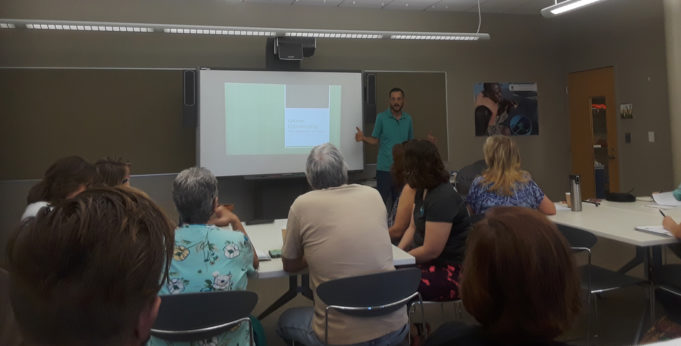One morning not too long ago, 20 chatty gardeners gathered in a classroom at the Botanical Research Institute of Texas, whose Learn and Discover program regularly offers public workshops. The presentation was about urban gardening and led by Jason Ramsey, owner of the agricultural consulting business Perma-Scape Landscape Design and Management.
Over the next two hours, Ramsey gave tips on how to maximize the amount of plants and crops that can be grown in confined spaces, whether in a living room or backyard. His advice followed the principles of permaculture, which advocates for natural, pesticide-free practices. Directors at BRIT said they have seen increased interest in urban gardening recently thanks to new changes in city zoning laws, which have relaxed restrictions on where community gardens can be built.
Blue Zones Project, a public-private partnership sponsored by the Tennessee-based healthcare company Healthways, has become an influential proponent of urban gardening. The organization partners with BRIT, hospitals, the City of Fort Worth, and employers like Lockheed Martin to encourage healthy eating and lifestyle choices for Fort Worthians.
“Research has shown the great benefits of gardening, not only physically but for mental and emotional health,” said Brandy O’Quinn, Blue Zones’ public affairs manager. The priority for her group, she continued, is to provide people with access to high-quality, affordable produce.
That access is a public health concern, especially for the young and disadvantaged. According to Tarrant County Public Health, 26 percent of children in Tarrant County have limited access to food and 50 percent of kids in the Fort Worth school district are either obese or overweight. In August 2016, Fort Worth City Council passed an ordinance that allows for urban agriculture in all zoning districts, at the behest of Blue Zones and other organizations.
Back in the BRIT classroom, Ramsey opened the class by discussing potted plants.
“If you have a small patio, tomatoes are probably the biggest thing you’ll want to grow,” he said. “The type of plant and its water requirements may change the pot size as well. You need to provide the right amount of drainage.”
From there, the topic moved to irrigation and watering.
“Don’t you water new shrubs once a week?” one guest asked.
“I advise people to, but I don’t,” Ramsey replied. “If I plant something new, I’m probably going to water it soon after planting. … By month three, I should be walking away. Now, if it’s August, you may want to go out there. If your plants aren’t hurting, I don’t recommend watering.”
Toward the end of the program, Ramsey described how he composts excess food.
“Compost piles take a lot of time,” he said. “You need about a cubic meter of compost material. A cubic meter is a large amount. To flip it takes about 30 minutes. I’m six years [into maintaining my garden soil]. I’m not really at a point where I need composting. But I do have food scraps from the house. I use worms. I can take my excess worms to my chickens. Now I have somewhere for all my food scraps.” (An upcoming class will cover composting with worms more thoroughly.)
BRIT staffers took a break from giving adult education classes for a couple of years, said Laura Venhaus, the institute’s library and public engagement director. In the recent past, she has seen a resurgence of public interest in all forms of horticulture. The work of Blue Zones, she said, has only strengthened interest in urban agriculture as an environmentally sustainable and healthy alternative to processed foods.












